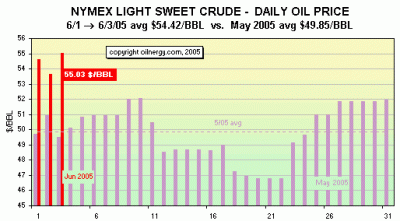Energy Bill Politics
Posted By RichC on June 6, 2005
With crude oil once again closing above $55.00/barrel and the potential for gasoline to rise closers to $3.00/ gallon, the pressure is being felt by congress to actually get an energy bill passed and sent to President Bush.

An article in today’s WSJ (subscription required) details some fo the components that have derailed the the bill these past two years, but with heavy pressure from voters the elected representatives and senators may feel obligated to compromise and present a bill. Senator Pete Donmenici (R) may have summed up it up when he explained that that he “is not inclined to spend too much time in search of the ideal” but insteads suggests that Republicans who control the Senate must shape a bill “always with an eye for votes.”
Since I have been following the energy bills from the biodiesel perspective, it is interesting to see how the crafting of the current bills are not at all that focused on this small piece (it wasn’t even mentioned in the WSJ article). Ethanol take much more of the limelight and the debate is not whether to incentify using it, but where to dervive the ethanol from. Currently the majority of our ethanol comes from corn and lobby support is heavy in the midwestern farm belt. Many in congress are hoping to also encourage and federally subsidized ethanol made from farm ‘waste,’ rice hulls and barley straw too. The use of ethanol in part is how the Senator Landrieu’s (D) commitee version of the the energy bill wants to cut our 20 billion barrel per day consumption of petroleum by 5% over the next ten years, or 350 billion barrel per year by 2015. There are no specifics, but the automotive industry will probably object to these kinds of reductions.
Must of the debate around the energy bill is focused on the exploration of new natural gas and oil reserves. Some like Senator Mary Landrieu (D) argue that “people have a right to know what is out there.” Interestingly this ‘exploration’ is not a partisan issue, but one that is location based issue. For example, Jeb Bush the Republican governor of Florida and Arnold Schwarzenegger, governor of California, oppose offshore drilling and are expected to make their voices heard on an further coastline exploration. ANWR will continue to be a major hurdle in developing more domestic capacity and was the big 2002 energy bill killer. This year the Republican will move that component out of the energy bill in hopes to avoid a Democrat-led fillibuster and get a bill to the President’s desk.
Interestingly there is more common ground than areas of disagreement. Most will support incentives and insurance assistance for new nuclear power plants. Clean coal is supported as are incentives for coal-gasification plants. (this removes some pollutes before using it to create electricity) After last years blackout, a bill will support new rules and incentives for both utilities and their investors to upgrade the power grid. There will continue to be support for renewable energy such as wind, solar, geothermal and farm waste for electrical production although most see this as a very small contributor toward contributing toward our nation’s energy use.
As for biodiesel, it was not mention in the WSJ article, but there does seem to be widespread support considering the current tax incentive that is in place. I doubt much time is spent or that most representative are even familiar with algae based biodiesel as a future fuel option, but it was mentioned that there is widespread support for incentives that encourage hydrogen power in vehicles.
My personal thought is that congress has spent several years discussing a new approach to our energy problem and that it is time they work out the differences and pass some kind of vision/bill for the sake of our country. With the 2006 congressional elections and continued high energy cost, now is the time to get a bill to the President.
Comments